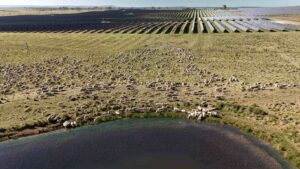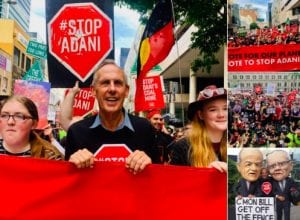The fossil fuel industry is facing a $US33 trillion ($A45.8 trillion) hit to its expected revenues over the next 20 years, following the dramatic and unexpected result of the Paris climate change conference last weekend.
 Energy analysts from the UK-based investment bank Barclays said the Paris deal, which aims to cap global warming well below 2°C, with an aspirational target of 1.5°C, will result in a boost to renewable energy, and will cause a rethink from investors about new investments in fossil fuel sources.
Energy analysts from the UK-based investment bank Barclays said the Paris deal, which aims to cap global warming well below 2°C, with an aspirational target of 1.5°C, will result in a boost to renewable energy, and will cause a rethink from investors about new investments in fossil fuel sources.
Lead analyst Mark Lewis says the implications for the fossil fuel industry are profound, and will likely cause it to suffer a loss in revenue of around $US33 trillion out to 2040 over business as usual.
Most of this will be felt in the oil sector ($US22 trillion), but also in the gas ($US6.1 trillion) and the coal sectors ($US5.7 trillion). The impact is felt mostly from investments that won’t go ahead as a result of the renewed push to decarbonise the world’s energy system, rather than from existing assets.
The findings of Lewis, and other leading financial analysts, contrast sharply with those within Australia’s Coalition government, some of whom dismissed the Paris Agreement as likely to have no effect on the fossil fuel economy.
Liberal MP Craig Kelly poked fun of the deal in a Facebook post quoting climate contrarian Bjorn Lomborg, a favourite of both foreign minister Julie Bishop and environment minister Greg Hunt. Dennis Jensen, who wanted to be science minister but is a climate denier, described the agreement as meaningless.
This may be the thinking in certain parts of the political mainstream in Australia, particularly on the conservative side, but it is completely out of step with what is going on in the rest of the world.
Barclay’s Lewis says the Paris deal will combine with greater investment caution, and new standards and requirements introduced by the Bank of England, that will seek to avoid over-investment in what appear to be stranded assets.
‘The upshot of the Paris Agreement will be a tightening of climate policy over time that should speed up the deployment of renewable and other zero and low-carbon energy sources and thereby accelerate the transition to a low-carbon global energy system that is already underway in any case,” Lewis says in the report.
“The message from our analysis for fossil-fuel companies is that they will need to be increasingly cautious regarding future investments in high-cost, high-carbon projects, as these are the ones most vulnerable to future stranding under any future policy tightening of the carbon constraint.
“Moreover, given the sheer size of the numbers we are talking about here, it would not require a policy outcome in future climate negotiations to be fully in line with a 2°C world for the appropriate investment profile for fossil-fuel companies to change significantly.”
Indeed, Lewis says even if – after the next stocktake, review and new pledges are concluded and received by 2020 – the world is still heading on a trajectory short of 2°C, it would still “significantly lower fossil-fuel investments and much higher clean-energy investments” than the trajectory the world is on at the moment.
Lewis noted that one of the main reasons why a political deal at COP21 in Paris was possible in the first place was because the costs for different renewable energy technologies had fallen so much since the Copenhagen COP, in 2009.
“With the Paris Agreement now committing the Parties to a more ambitious long-term temperature objective than ever before, and to five-year reviews of their INDCs (country pledges) as a way of getting on track to meet that long-term objective, the ground has been laid for an ongoing tightening of climate policies globally over the next few decades.”
Lewis took particular note of the decision by The Financial Stability Board – the global body established by the G20 group of nations after the global financial crisis of 2008-09 to improve international financial regulation – to establish a Task Force for Climate-Related Financial Disclosure (TCFD) to be chaired by the former mayor of New York City, Michael Bloomberg.
The aim is to develop a consistent global reporting standard for companies on the climate-related risks they are exposed to, and give financiers s the information they need to allocate capital as efficiently as possible.
“We think this will lead to increased pressure on companies to monitor and disclose their carbon risks, and to greater awareness of and attention to the carbon intensity of different companies on the part of investors.”
And he noted, there is considerable investor momentum on the climate risks of listed companies, which will be further reinforced by the Paris Agreement.






